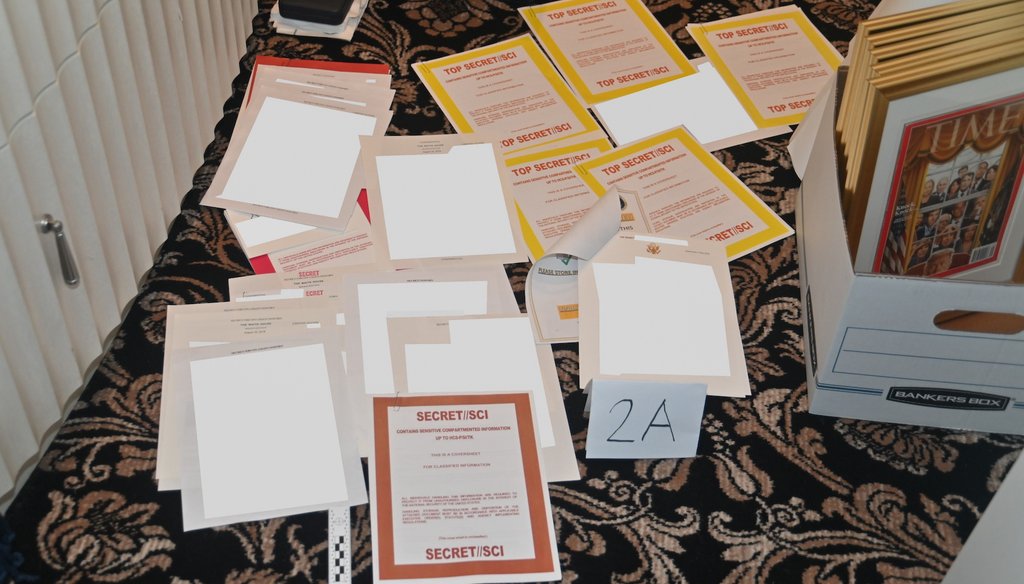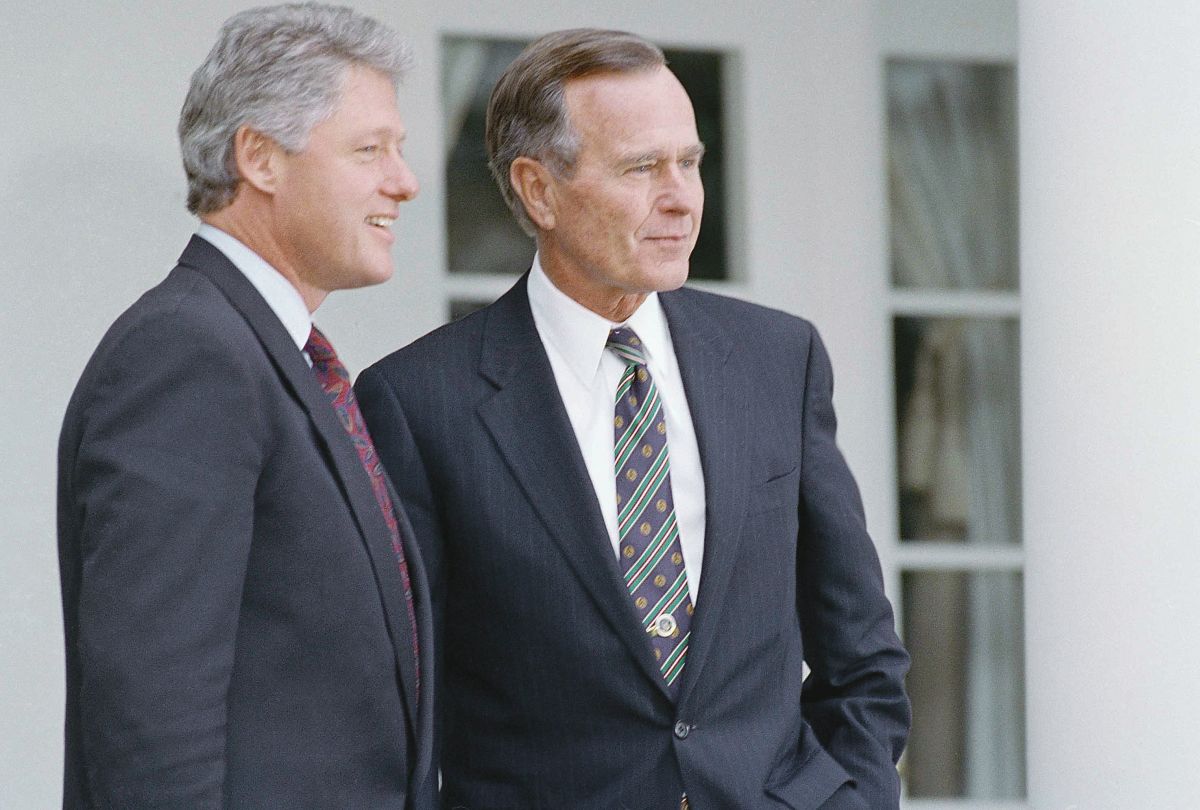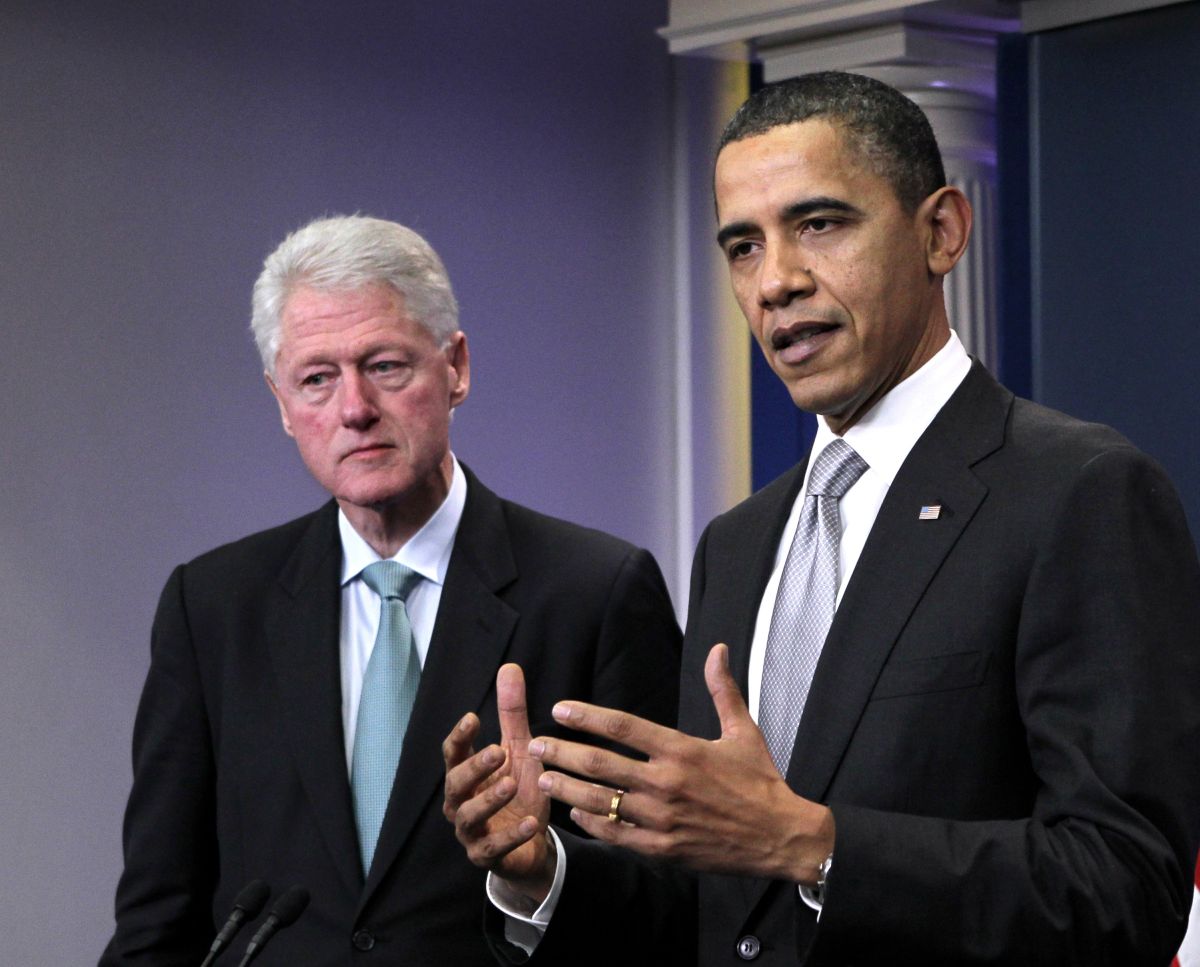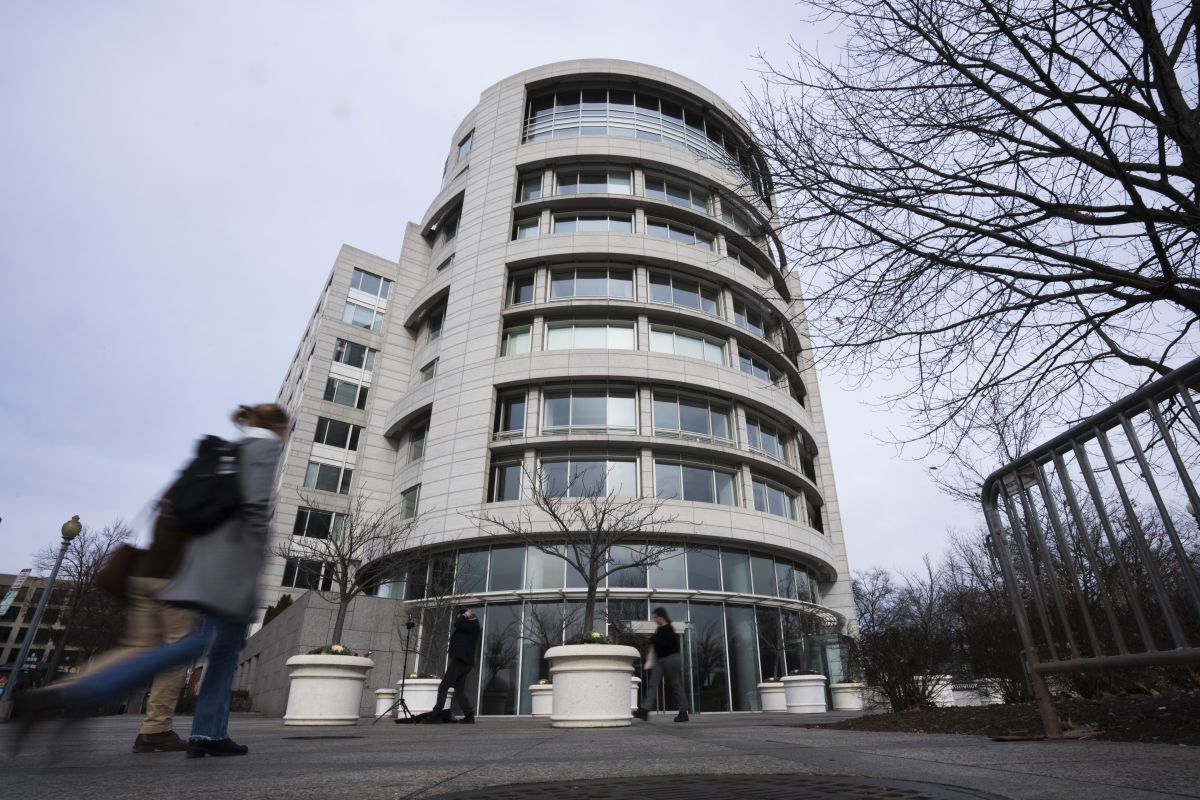Stand up for the facts!
Our only agenda is to publish the truth so you can be an informed participant in democracy.
We need your help.
I would like to contribute

A court filing by the Justice Department in August 2022 contains this image of documents seized during the FBI's search in Donald Trump's Mar-a-Lago estate. (AP)
If Your Time is short
-
A comparison of past presidents’ handling of classified documents after office is distorted. The documents of George H.W. Bush, Bill Clinton and Barack Obama were transferred to temporary sites in cooperation with the National Archives.
-
Donald Trump kept documents after his presidency without authorization at his Mar-a-Lago resort.
-
There is still a lot we don’t know about Joe Biden’s case, but the Instagram post’s assertion that Biden “had no power” to declassify classified documents in his possession is premature.
As the American public has recently been finding out, when presidents and vice presidents leave the White House, their documents may end up in unexpected places.
Ted Nugent, a rock musician and prominent supporter of conservative causes, recently shared a graphic on Instagram that said only one former president — Donald Trump — had his property raided to retrieve presidential documents, despite unusual setups among Trump’s predecessors.
The image said that George H. W. Bush kept his documents in a combination of bowling alley and Chinese restaurant, that Bill Clinton kept his documents in the trunk of an "abandoned car dealership" and that Barack Obama kept his documents in an old furniture store. (The post skips over George W. Bush.)
Despite these seemingly sloppy practices, the post contends, "no raid" was conducted, referring to the judicially approved search warrant issued on Donald Trump’s Mar-a-Lago resort last year, in which law enforcement was tasked with securing documents Trump had taken after his presidency.
The post portrays Trump’s document handling as superior, saying his documents were kept under Secret Service supervision. As for the current president, Joe Biden, the post says he "kept documents he had no power to declassify, in a building funded by China."
This post was flagged as part of Facebook’s efforts to combat false news and misinformation on its News Feed. (Read more about our partnership with Facebook.)
The post offers a lot to unpack. With a few exceptions, the post twists the reality of most of these examples and makes unjustified comparisons.
One overriding difference between the other cases and Trump: Those presidents were cooperating with the National Archives.
"There's a big difference between having records in a facility managed by the National Archives, even if it is a rented facility, and having records in a private residence," said Benjamin Hufbauer, an associate professor of art history at the University of Louisville and an expert in presidential libraries.
Then-President George H.W. Bush and president-elect Bill Clinton at the White House in 1992. (AP)
This is distorted.
Bush’s papers initially went to a former bowling alley and Chinese restaurant in College Station, Texas, as they were being analyzed by National Archives officials and organized for transfer to Bush’s presidential library in College Station, which opened in 1997.
Robert Holzweiss, deputy director of the Bush library and a member of the team that worked at the former bowling alley and Chinese restaurant, told People magazine in 2022 that it has been common for presidential library staffers to convert seemingly unusual venues into transitional spaces as the final building is being constructed.
"It's rare to find one that can store such a voluminous trove of paper," he told the magazine. "So archivists and museum staffers have to get creative."
"Uniformed guards patrol the premises," The Associated Press reported in 1994. "There are closed-circuit television monitors and sophisticated electronic detectors along walls and doors. Some printed material is classified and will remain so for years; it is open only to those with top-secret clearances."
In other words, the archives ensured that the documents, including the classified ones, were secure according to federal standards.
This is also distorted.
In Clinton’s case, the National Archives chose as the temporary site for organizing documents the former home of the Balch Motor Co., at 1000 LaHarpe Blvd. in Little Rock, Arkansas. As with Bush’s bowling alley and Chinese restaurant, this was done according to guidelines with the cooperation of the National Archives, with a similar level of security. The arrangement was announced May 3, 2000.
The wrinkle in this case is that, years earlier, some Clinton papers were found, separately, in the trunk of an abandoned car. Nugent’s post appears to conflate these two events.
In 1997 — in the middle of Clinton’s presidency — news reports said employees of a Little Rock junkyard found a collection of files in the trunk of an abandoned car. The files included a 1982 check for over $20,000 payable to Clinton from Madison Guaranty Savings & Loan. In the bank fraud trial of James McDougal, Madison’s former owner, Clinton testified under oath that he had "never borrowed money from Madison Guaranty."
The president’s lawyer at the time, David Kendall, said that "if authentic," the check might likely have been issued to pay off a loan at a McDougal-owned bank. Clinton and McDougal were onetime partners in a real estate project known as Whitewater, and Kendall said McDougal took out a $30,000 loan in August 1981 to provide capital for the venture.
The junkyard owner ceded the Madison Guaranty records to the FBI and Whitewater independent counsel Kenneth Starr. Setting aside its disputed provenance, the check would not have been a classified document, which refers to federal documents deemed by national security or intelligence officials to contain government secrets.
Former President Bill Clinton and then-President Barack Obama in 2010. (AP)
This, too, is distorted.
Like Bush’s bowling alley and Clinton’s converted car dealership, the Obama site chosen with the cooperation of the National Archives was a former furniture store.
The Chicago Tribune reported in spring 2016 that paperwork, electronic data and artifacts from Obama’s presidency would go to the old Plunkett Home Furnishings store in Hoffman Estates, Illinois, which was converted into a "NARA-controlled facility," according to a memorandum of understanding between the Obama Foundation and the National Archives. (NARA stands for National Archives and Records Administration.)
The National Archives moved records to the Hoffman Estates facility at the end of his presidency "under the assumption that former President Obama and his Foundation would be building and transferring to NARA a traditional, physical presidential library in the Chicago area," the National Archives said in a Sept. 23 statement.
However, Obama eventually decided that he wanted a digital library rather than a physical one, so when that decision was made, the National Archives took the classified records back to secure locations in the Washington D.C., area.
This is misleading in several ways. The examples of Bush, Clinton, and Obama involved presidential papers going to locations in partnership with the National Archives, which is how these efforts are supposed to be handled. No search warrant would have been necessary in these cases, because each president was cooperating with the archives.
By contrast, the documents taken under the Mar-a-Lago search warrant were ones Trump held without the National Archives’ authorization, and that he lacked the right to possess after his presidency. The Presidential Records Act requires that all documents be returned to the National Archives upon a president’s departure. That’s the case for nonclassified documents as well as classified ones.
It’s also misleading to refer to Mar-a-Lago as simply "a private home." Mar-a-Lago, in Palm Beach, Florida, is also a resort that is open to members and visitors attending functions — unlike the residences of Biden in Wilmington, Delaware, and former Vice President Mike Pence in Carmel, Indiana, where classified documents have also been found).)
Finally, it’s not clear that the Secret Service was actively handling "supervision" of Trump’s presidential papers, even when they were at Mar-a-Lago to protect the former president.
The building that has housed the Penn Biden Center in Washington, D.C., on Jan. 10, 2023. (AP)
Both points are murkier than Nugent’s post describes.
Broadly speaking, vice presidents have the power to declassify certain documents under the active executive order for how presidents and vice presidents should handle classified information. The big unknown is how this might apply to the documents in Biden’s case.
An executive order Obama issued gives the president and the vice president original classification authority, which means authority to initiate classifying information.
Section 3.1 says information shall be declassified or downgraded by, among others, "the official who authorized the original classification, if that official is still serving in the same position and has original classification authority."
In other words, because Biden had original classification authority as vice president, he also had authority to declassify information that he had classified in the first place.
We don’t know who initiated the classifications on the documents found in Biden’s home and office, because that information hasn’t been released yet. So, it’s unclear whether Biden could have possessed the power to declassify the specific documents found in the two private locations.
As for the building being "funded by China," Trump is referring to Biden’s post-vice presidential office, at the Penn Biden Center for Diplomacy and Global Engagement in Washington, D.C. Biden started the think tank as an affiliate of the University of Pennsylvania, where he held a part-time position after his vice presidency. He used the office periodically from mid-2017 until he launched his 2020 presidential campaign, in April 2019.
Trump and others have used the discovery of documents at the center to claim, without direct evidence, that the Penn Biden Center is "funded" by China.
Ron Ozio, a University of Pennsylvania spokesperson, said in a Jan. 11 statement to PolitiFact that the Penn Biden Center has never solicited or received gifts from China or any foreign entity, and that its budget comes solely from university funds.
Since the center’s 2017 founding, the statement said, there have been three unsolicited gifts from two American donors totaling $1,100.
The university as a whole received $54 million in donations from entities in China from 2014 to 2019, according to an April 2022 New York Post article. From 2013 to 2020, U.S. universities received nearly $1 billion from Chinese entities, according to Bloomberg News.
RELATED: GOP congressman oversimplifies claim on classified documents amid Biden investigation
RELATED: Joe Biden classified documents timeline: Where, when were files found?
RELATED: Timeline: Classified documents seized at Donald Trump’s Mar-a-Lago home
Our Sources
PolitiFact, "A bowling alley, a Chinese restaurant, and George H.W. Bush: What was Donald Trump talking about?" Oct. 10, 2022
PolitiFact, "Claims about Obama Foundation keeping classified records in an abandoned warehouse are wrong," Oct. 6, 2022
Washington Post, "Check From S&L To Clinton Found In Ark. Junkyard," Nov. 6, 1997
Los Angeles Times, "Check to Clinton a Loan, McDougal Says," Nov. 12, 1997
National Archives, Press Release, May 3, 2000
Memorandum of Understanding between the Obama Foundation and the National Archives and Records Administration
National Archives, Press Statements in Response to Media Queries About Presidential Records, Sept. 23, 2022
Presidential Records Act of 1978
New York Times, Inside Mar-a-Lago, Where Thousands Partied Near Secret Files, Dec. 15, 2022
PolitiFact, "Trump is wrong; Biden did have the right to declassify records as VP," Jan. 19, 2023
Executive Order 13526 - Classified National Security Information, Dec. 29, 2009
PolitiFact, "Trump, Biden classified documents cases differ in key ways. Here’s how." Jan. 10, 2023
PolitiFact, "Fact-checking Joe Biden on being a full professor for four years," April 22, 2022
TruthSocial post, Jan. 9, 2023
New York Post, "$54M in Chinese gifts donated to UPenn, home of Biden Center," April 9, 2022
Bloomberg, "Harvard Leads U.S. Colleges That Received $1 Billion From China," Feb. 6, 2020
Instagram post, Jan. 18, 2023












































